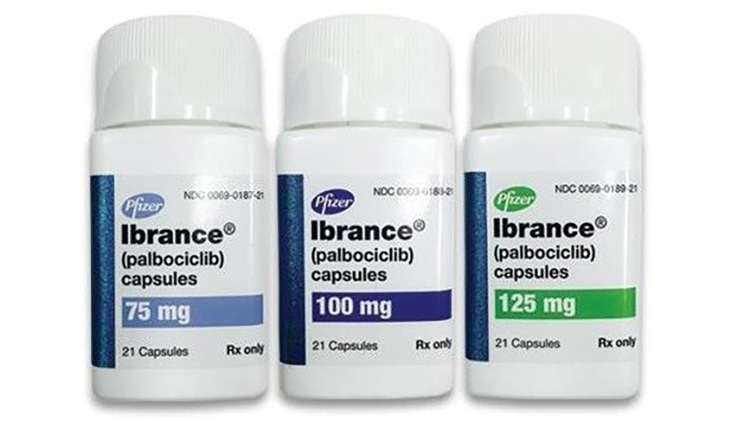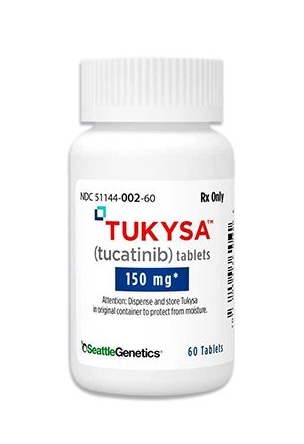Ibrance (palbociclib) vs Tukysa (tucatinib)
Ibrance (palbociclib) vs Tukysa (tucatinib)
Ibrance (palbociclib) is a CDK4/6 inhibitor used primarily in combination with hormonal therapies to treat HR-positive, HER2-negative advanced or metastatic breast cancer. Tukysa (tucatinib), on the other hand, is a tyrosine kinase inhibitor targeting HER2, and it is used for the treatment of adults with HER2-positive breast cancer that has spread to other parts of the body, including the brain, and who have received one or more prior anti-HER2 breast cancer treatments. The choice between Ibrance and Tukysa would largely depend on the specific characteristics of the breast cancer, particularly hormone receptor and HER2 status, as well as prior treatments and individual patient factors, thus a healthcare provider would need to evaluate the patient's cancer profile and medical history to determine the most appropriate treatment option.
Difference between Ibrance and Tukysa
| Metric | Ibrance (palbociclib) | Tukysa (tucatinib) |
|---|---|---|
| Generic name | Palbociclib | Tucatinib |
| Indications | HR-positive, HER2-negative breast cancer | HER2-positive breast cancer |
| Mechanism of action | CDK4/6 inhibitor | Tyrosine kinase inhibitor |
| Brand names | Ibrance | Tukysa |
| Administrative route | Oral | Oral |
| Side effects | Neutropenia, leukopenia, infections, fatigue | Diarrhea, palmar-plantar erythrodysesthesia, nausea, fatigue |
| Contraindications | None known | None known |
| Drug class | Antineoplastic agent | Antineoplastic agent |
| Manufacturer | Pfizer | Seagen Inc. |
Efficacy
Ibrance (Palbociclib) Efficacy in Breast Cancer
Ibrance (palbociclib) is a targeted therapy drug used to treat certain types of breast cancer. Specifically, it is approved for the treatment of hormone receptor-positive (HR+), human epidermal growth factor receptor 2-negative (HER2-) advanced or metastatic breast cancer. Palbociclib is often used in combination with hormonal therapies, such as an aromatase inhibitor or fulvestrant, depending on the patient's menopausal status and prior treatments. Clinical trials have demonstrated that palbociclib, when used in combination with these hormonal therapies, can significantly improve progression-free survival (PFS) compared to hormonal therapy alone. This improvement in PFS means that the disease does not worsen for a longer period of time when palbociclib is added to the treatment regimen.
The PALOMA-2 and PALOMA-3 studies are key clinical trials that have highlighted the efficacy of palbociclib. In the PALOMA-2 trial, palbociclib combined with letrozole showed a substantial improvement in PFS compared to letrozole alone in postmenopausal women with HR+/HER2- advanced breast cancer. Similarly, the PALOMA-3 trial demonstrated that palbociclib in combination with fulvestrant significantly improved PFS in women with HR+/HER2- metastatic breast cancer who had progressed on prior endocrine therapy. These results have established palbociclib as an important component of therapy for this patient population.
Tukysa (Tucatinib) Efficacy in Breast Cancer
Tukysa (tucatinib) is a medication used for the treatment of HER2-positive breast cancer. Unlike palbociclib, tucatinib targets the HER2 protein, which is overexpressed in some breast cancer cells and promotes their growth. Tucatinib is used in combination with trastuzumab and capecitabine for the treatment of adult patients with advanced unresectable or metastatic HER2-positive breast cancer, including patients who have received at least one prior anti-HER2-based regimen in the metastatic setting. The addition of tucatinib to trastuzumab and capecitabine has been shown to significantly improve both PFS and overall survival (OS) in patients with HER2-positive metastatic breast cancer.
The efficacy of tucatinib was established in the pivotal HER2CLIMB trial, which included patients with HER2-positive metastatic breast cancer, including those with brain metastases. The trial demonstrated that the addition of tucatinib to trastuzumab and capecitabine resulted in a 46% reduction in the risk of disease progression or death compared to trastuzumab and capecitabine alone. Furthermore, the addition of tucatinib led to a significant improvement in OS. These results have made tucatinib an important treatment option for patients with HER2-positive metastatic breast cancer, particularly for those with brain metastases, where effective treatment options are limited.
Regulatory Agency Approvals
Ibrance
-
European Medical Agency (EMA), European Union

-
Food and Drug Administration (FDA), USA

-
Health Canada

-
Therapeutic Goods Administration (TGA), Australia

-
Medsafe (NZ)

Tukysa
-
European Medical Agency (EMA), European Union

-
Food and Drug Administration (FDA), USA

-
Health Canada

-
Therapeutic Goods Administration (TGA), Australia

-
Swissmedic (CH)

Access Ibrance or Tukysa today
If Ibrance or Tukysa are not approved or available in your country (e.g. due to supply issues), you can access them via Everyone.org.
How it works

Make an enquiry
Choose the medicine you want to buy, answer a couple of questions, and upload your prescription to speed things up. We’ll get back to you within 24 hours.


Make an enquiry
Choose the medicine you want to buy, answer a couple of questions, and upload your prescription to speed things up. We’ll get back to you within 24 hours.


Breeze through the paperwork
We'll guide you through the required documents for importing unapproved medicine, ensuring you have all the necessary information.


Get a personalized quote
We’ll prepare a quote for you, including medicine costs and any shipping, administrative, or import fees that may apply.


Receive your medicine
Accept the quote and we’ll handle the rest - sourcing and safely delivering your medicine.

Some text on this page has been automatically generated. Speak to your physician before you start a new treatment or medication.
Let's talk
If you have any questions, call us or send us a message through WhatsApp or email:
Contact us




